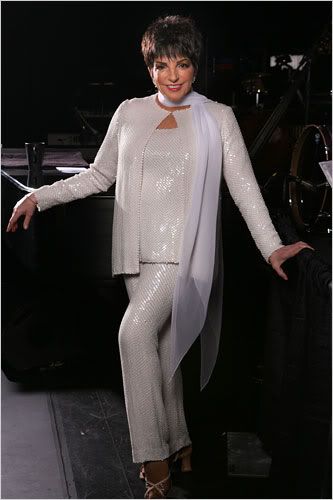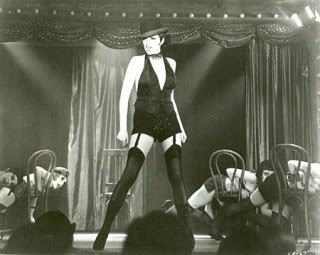Liza regresa !!!!!!
Theater | ||
| Comeback With a 'Z' By CHARLES ISHERWOOD Published: November 26, 2008 LIZA MINNELLI is poised for a comeback. Again. | ||
 Tony Cenicola/The New York Times Liza Minnelli in Woonsocket, R.I., where she performed four shows this month in preparation for her return to Broadway. | ||
As she prepares a return to Broadway for the first time in almost a decade, in a new show called "Liza's at the Palace ...," opening Wednesday, Ms. Minnelli is looking hallelujah! healthy and happy at 62, and sounding strong and grounded. "I just feel like I've come through a whole bunch of stuff," she explained in the living room of her Upper East Side apartment, a sleek marble-and-mirrors aerie in which it is easy to imagine the ghost of Halston languidly stalking the halls, trailing a phantom stream of cigarette smoke. "But I have never felt better in my life. I feel free. I feel happy. I feel completely solid. Calmer and more focused. I understand how intelligent I am." The words were spoken with Ms. Minnelli's customary earnest exuberance, instantly instilling belief. But as this veteran performer's recent highly publicized turnaround made spectacularly clear, a sparkling return to form can ultimately prove to be a fireball presaging another crash landing. It was just six years ago, after all, that Ms. Minnelli came roaring back from a brush with death, surgeries to replace two hips and a knee, and the garden-variety tussles with addiction that had plagued her for years. In the spring of 2002 she embarked on a tour of a new show that lived up to its title, "Liza's Back," and earned some of the most rapturous reviews of her career. Writing in The New York Times, Stephen Holden hailed the concert as nothing short of a "resurrection." Wreckage followed the resurrection, in breathtakingly short order. Ms. Minnelli had married David Gest, the "who he?" impresario whom she credited with engineering her comeback, in a highly publicized wedding (Ms. Minnelli's fourth) that took place just a couple of months before those New York concerts. Less than two years later divorce papers were filed. The tabloids boiled with unseemly accusations from Mr. Gest that made the couple's freakish nuptials, with Michael Jackson and Elizabeth Taylor in attendance and a now-you-may-kiss-the-bride moment of unforgettable creepiness, look like a decorous tea party. Understandably, Ms. Minnelli does not relish the prospect of reliving this tumultuous period in her life. At times she honestly seemed to have forgotten in its entirety an episode she referred to at one point as a "hiccup." When asked if she was daunted by the prospect of living up to the ecstatic reception of her last New York show, she seemed to think the reference was to a 1999 Broadway appearance, also at the Palace: a less enthusiastically reviewed tribute to her father, the film director Vincente Minnelli. Could her powers of regeneration be so strong that she has forgotten her last comeback? "I don't remember those shows well," she admitted of the last New York appearances, produced by Mr. Gest. "Because it was complicated. I wasn't in charge of anything. I was being shoved around a lot. There were things I didn't agree with in it. I didn't have much say." In retrospect, how does she explain the strangest interlude yet in a life not without notorious episodes? "Encephalitis," she deadpanned, with a little extra pop of the doe eyes. That would be the viral brain disease that almost killed her in 2000. Doctors told her she would never perform again, and Ms. Minnelli painstakingly had to relearn how to sing, to move, even to talk. It was hardly surprising that she clung to the first human life raft she came across. But the recovery from the man who commandeered her recovery and subsequent renaissance has not been entirely smooth either. An infamous Larry Kinginterview in 2006 somewhat soured the effect of the good notices she'd won for her delicious, self-lampooning appearances on the cult television series "Arrested Development." Looking bloated and sounding bronchial overexuberant even by her own ebullient standards Ms. Minnelli chatted loopily, giving rise to new rumors about substance abuse. And just last December she was flown from Sweden back to the United States and briefly hospitalized after collapsing as she walked offstage during a concert. A severe tooth infection was the problem, Ms. Minnelli said, gamely pointing out a bridge to prove the point. Whatever the reason debate all you want the genetic factor or the toxic effects of living in a showbiz bubble since birth Ms. Minnelli's career and life had eerily come to embody the knock-'em-dead-while-you're-dying-inside ethos of some of the songs most closely associated with her (and the triumph-to-tragedy cycles in the life of her mother, Judy Garland). She points to the lyrics of "But the World Goes 'Round," an anthem to endurance written for her by her longtime collaborators John Kander and Fred Ebb. "One day it's kicks, then it's kicks in the shins," she quoted when asked to give a retrospective glance to her peculiar past. Ms. Minnelli has been getting her kicks more quietly since she parted ways with Mr. Gest, and despite a cough imported from Italy that left a burr in her throat, there was palpable relief in her voice as she related her pleasure at being single. "I don't have somebody telling me, 'Be quiet' none of that in my life anymore," she said. "It's just so wonderful to not be tied down for the first time. I've never been not dating or not with someone or not in love. Like a lot of women my age, I thought for a long time that unless you were with somebody, you weren't accepted." | ||
But the emotional demands and psychic costs of a life onstage played their part too. "You sing to a whole bunch of people, and you come offstage, and you want to see one person," Ms. Minnelli said. "Now I sing to a whole bunch of people, I say, 'Thank you,' and that's fine. Then I go out and have something to eat with friends." A new song written for her show, "I Would Never Leave You," constitutes a heartfelt reaffirmation of her unusually intense emotional pact with her fans, most of whom have never allowed the clouds of scandal to dim their affection for her. It's a love song directed not at a man, or a dream of a man, or a man that got away, but at the anonymous but adored people in the seats right in front of her, the only constant in a sometimes careering career, to borrow Stephen Sondheim's turn of phrase. I never left though I've been left alone With every breath I am stronger on my own The smoke has cleared and look who's here The same dame you've always known ... Ms. Minnelli played an unmixed recording of the song that she had made that afternoon. (It's written by Billy Stritch, Johnny Rodgers and Brian Lane Green.) The voice has darkened over the years, but the singing was confident and quietly impassioned. As her voice has changed, Ms. Minnelli has, at her best, scaled back the throbbing intensity in her singing to reveal a more shaded approach to lyrics, influenced by her admiration of Charles Aznavour. Her new show also includes Mr. Aznavour's "What Makes a Man a Man," as well as one of Ms. Minnelli's rare forays into her mother's repertory, a version of her Palace Theater medley. The show is produced by Ms. Minnelli's longtime concert presenter, John Scher, and his company, Metropolitan Talent Presents, along with Ms. Minnelli's own company, Jubilee Time Productions. If skeptics need proof of Ms. Minnelli's solid good health, consider the punishing schedule she maintained in the weeks before the New York opening. After performing and rehearsing in Italy for three weeks, she flew home on a Saturday and went into the studio on Sunday morning to record five songs for a new CD tied to the Palace show. At 9 that evening she sat down for a long interview. After a day in the city doing more publicity, she was off to Rhode Island to perform four final shows before coming in to New York. Hard work and healthy laughter seem to be the two tonics Ms. Minnelli finds most useful and most necessary these days. (She is not drinking, although she prefers to keep to herself the details of the length of her sobriety. "It's a discipline like anything else," she said. "You do the best you can every day to take better care of yourself.") Both work and humor, she noted, were the fundamental legacies from her parents and her Hollywood childhood. "The thing I remember is how much laughter there was," she recalled. "All that other stuff was there, of course. But the other stuff was never as serious or as long-lasting as everybody wanted it to be. I remember people creating drama when there wasn't any. "There was a lot of work too. Even as a kid I remember being on schedule all the time. Everybody in Hollywood was on a schedule. It was like a mining town, but we were making movies." Her new show climaxes in a tribute to her godmother, Kay Thompson, like Garland a woman of protean talents, intense drive and a wickedly sharp sense of humor. Thompson, who died in 1998 after living the last five years of her life in Ms. Minnelli's apartment, is best known today as the author of the "Eloise" books, about a precocious child loose in the Plaza Hotel and similarly swank locales. Her single significant film appearance, as a crisply chic fashion editor in the Fred Astaire-Audrey Hepburn musical "Funny Face," remains a touchstone for gay audiences. (Lithe, effortlessly imperious and glam as bangles, she makes Heidi Klum of "Project Runway" look like a hausfrau in heels.) But Ms. Thompson was also a first-rate musician who was playing Liszt on the piano with the St. Louis Symphony at the age of 16. She was considered by many experts to be the best vocal arranger and vocal coach in Hollywood in the 1940s, and she had a brief but dazzling career as a nightclub performer. The bubble machine in Ms. Minnelli's psychic makeup goes into overdrive when she discusses Thompson. "What I remember the most is that everything changed when she walked in a room," she said. "The energy changed, the atmosphere changed. She was it. She was Hollywood's secret weapon. "She taught me how to sing more than anyone. She taught me how to move. She taught me about a certain level of performance I didn't know about until I started to work with her. And she was so funny. I remember her saying to me: 'Look, Liza, there's a crescent moon. God is paring his toenails.' " The new show actually began as a more modest plan to record Thompson's arrangements and some of her compositions. "I started talking about her to a record executive, who didn't know who she was," Ms. Minnelli recalled. "I played one of the arrangements, I told him a little more. And in the middle of the meeting I announced that whether it became a record or not, it was going to be a show. My lawyer fell off his chair." | ||
| ||
Ms. Minnelli recruited a longtime collaborator, Ron Lewis, who had all but retired to Las Vegas, to direct and choreograph. The second act of the new show is an attempt to recreate the fabled magic of Thompson's nightclub act, Kay Thompson and the Williams Brothers. (One of those brothers was Andy.) Although the original choreography, noted for its jazzy rhythms and speed, no longer exists, Mr. Lewis has used photographs to fashion new routines in the same style. Ms. Minnelli will be joined onstage by four male singer-dancers and will perform several of Thompson's best-known compositions. (They aren't very well known, in truth: "I Love a Violin"?) In discussing the range of Thompson's talents, Mr. Lewis, who joined Ms. Minnelli for lunch at the "21" Club (where else?) the next day, was eager to make a comparison. "Everybody knows Liza is an actress and a singer, and in her heart and soul a dancer more than anything else," he said. "But her hands are in every aspect of this show. I'm not talking about somebody who takes a look at a rack of costumes and says, 'I'll wear that one.' " "She has written more than half of the dialogue," he continued. "She has overseen arrangements. And in the recording studio she's telling the trumpets to take it up a notch. When the orchestra is playing, she can hear that one person is off half a note. That's the kind of ear she has. She is totally involved with the show." Ms. Minnelli is taking full responsibility for many things she once relied on her friend and mentor, Mr. Ebb, who died in 2004, to help oversee. "I was always Freddy's girl," she said. "But in that sense I was trained by the best, and now I can use it. And this show is so personal, I feel that I am finally finding my own voice for the first time." Given how long, and with what intensity, she has been using that voice, that is a major statement, metaphorical though it may be. Ms. Minnelli's life has contained so many highs the Oscar, the two Tonys and the Emmy are on low-key display in the piano room and such public lows that news media attention will probably always focus on charting the relative distance from the last peak or the last valley. If Ms. Minnelli's shows at the Palace are successful, the turbulent past will be a little more distant in the rearview mirror. And this time it will be a comeback she can truly call her own. | ||


